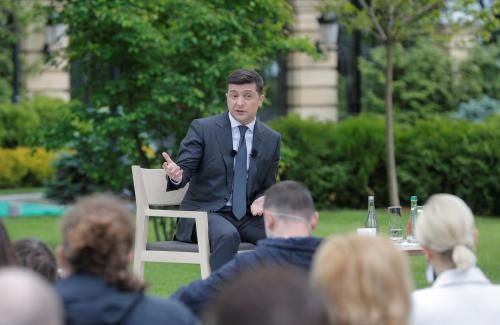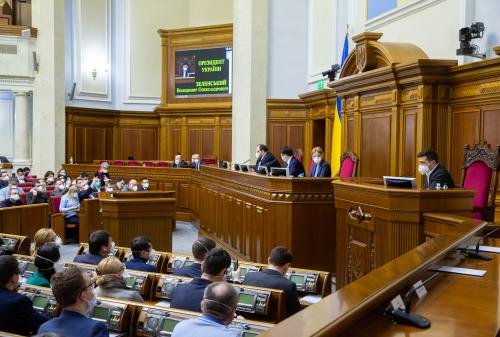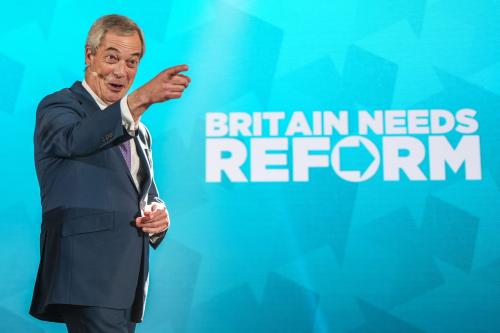COVID-19 has made matters in Ukraine more complex, plunging the economy into a recession and bringing little change to the conflict in Donbas; to bounce back, President Zelensky will need to follow through on anti-corruption measures and other reforms to strengthen Ukraine’s position, argues Steven Pifer. This post originally appeared on Europe’s World.
President Volodymyr Zelensky and his government in Ukraine face two fundamental challenges: ending the conflict with Russia and implementing domestic reform. Overcoming these challenges appeared hard enough at the start of 2020. COVID-19 is only making that more difficult.
Ukraine finds itself in the seventh year of a war imposed on it by the Kremlin. Russian troops seized Crimea in March 2014, and Russian and Russian proxy forces have sustained a conflict in the eastern Ukrainian region of Donbas, which has claimed some 13,000 lives.
While Moscow has sought to draw Ukraine back into Russia’s orbit, there is little reason to believe that it will succeed. Nothing has done more than Kremlin policy over the past six years to push Ukraine toward the West and away from Russia. Moscow thus has used the Donbas conflict to destabilize Kyiv—to make it more difficult for Ukraine to succeed and pursue its goal of integrating with Europe.
As COVID-19 hit both Ukraine and Russia in March, some (this author included) hoped it might change some of the calculations in the Kremlin. Faced with a pandemic, falling prices for its energy exports, and an economy tumbling into recession, might Moscow rethink its policy in Donbas? A settlement would ease Russia’s political isolation and lead to a lifting of Western sanctions, which some economists estimate have cut Russian gross domestic product by 1.0-1.5% per year over the past six years.
As of June, however, Moscow’s policy appears unchanged. Russian and Russian proxy forces continue low-intensity fighting in Donbas. The appointment of a new Kremlin point-person on Ukraine did not visibly affect policy, which is determined by Vladimir Putin.
German Chancellor Angela Merkel and French President Emmanuel Macron, both grappling with COVID-19 and its economic consequences, have not followed up on the December ‘Normandy format’ summit with Zelensky and Putin. As the pandemic consumes the leaders’ attention, they and others – such as senior U.S. officials – show little bandwidth or readiness to press to change the cost-benefit calculation in the Kremlin and persuade Moscow to take up a different course that might bring peace in Donbas.
Therefore there is little reason to expect a diplomatic breakthrough, a fact that Zelensky and his team increasingly seem to recognize. The Ukrainian president has raised the idea of a “Plan B” if no progress is made by the end of the year. One suggested variant for a “Plan B” would entail virtually walling off the occupied part of Donbas and pushing the entire economic and social burden on to Russia.
The sad reality is the likely near-term scenario for Donbas is continuing simmering conflict. (As for Crimea, while not a hot conflict, it will burden Ukrainian-Russian and West-Russian relations for years if not decades to come.)
COVID-19 has made matters more complex, both for Zelensky politically on the domestic front as well as sinking the economy into recession. Kyiv recognized the need for an IMF stand-by program and access to low-interest credits. The Rada (parliament) enacted legislation to lift the moratorium on the sale of agricultural land and safeguard nationalized banks from efforts by former owners to regain control—both key conditions for an IMF stand-by agreement worth up to $5 billion. On June 9, the IMF executive board approved the agreement.
While the long-needed reforms on agricultural land and banking were most welcome, it was not clear whether their adoption reflected a genuine commitment to dramatic reform or, as with past Ukrainian leaders, the need to secure IMF credits. Both Ukrainians and the country’s friends in the West are looking for signs Zelensky will carry out the transformational agenda that carried him to an electoral landslide in April 2019, particularly with respect to curbing corruption.
Zelensky attaches priority to ending the conflict and restoring Ukrainian sovereignty in Donbas. But Kyiv cannot do that by itself. Moscow gets a vote, and the vote thus far favors keeping the conflict simmering. Whether Ukraine’s Western partners can mobilize additional pressure to change the Kremlin’s cost-benefit calculation at this point appears doubtful, at least in the near term.
If stalemated by Russia on Donbas, Zelensky can still take action on anti-corruption measures and other reforms to position the Ukrainian economy for strong growth as the pandemic eases. These are measures that he and his government control. To do so would deliver on the promises made to Ukrainian voters last year and solidify his reform credentials with his Western partners. Moreover, a more robust economy would bolster Zelensky’s position vis-à-vis the Kremlin, which hopes that domestic weakness will force him to compromise key Ukrainian principles and settle the Donbas conflict on Moscow’s terms.
The Brookings Institution is committed to quality, independence, and impact.
We are supported by a diverse array of funders. In line with our values and policies, each Brookings publication represents the sole views of its author(s).









Commentary
What does COVID-19 mean for Ukraine’s frontlines?
June 18, 2020